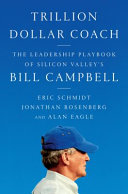

Trillion Dollar Coach is a profound exploration of the coaching philosophy of Bill Campbell, a legendary figure in Silicon Valley who played a pivotal role in shaping the careers of many influential leaders, including th...
Continue readingIn 'Trillion Dollar Coach', the authors emphasize the transformative power of coaching in both personal and professional realms. Coaching is not merely about giving advice; it’s about empowering individuals to realize th...
Continue readingOne of the central tenets of Campbell's coaching philosophy was the importance of building trust and strong relationships within teams. The book explains that trust is the foundation of effective teamwork and collaborati...
Continue readingThe book stresses that successful leadership goes beyond focusing solely on financial metrics and performance indicators. While these are important, Campbell believed that the heart of a successful organization lies in i...
Continue readingFeedback is a critical component of growth, and 'Trillion Dollar Coach' highlights how Campbell championed the practice of giving and receiving constructive feedback. The authors explain that feedback should be timely, s...
Continue readingThe book illustrates Campbell's belief that failure should not be feared but embraced as an opportunity for learning and growth. In the fast-paced world of technology and business, mistakes are inevitable. Campbell taugh...
Continue readingCampbell's coaching philosophy also revolved around the importance of having a clear purpose and vision. The book discusses how effective leaders articulate a compelling vision that inspires and motivates their teams. A ...
Continue readingFinally, 'Trillion Dollar Coach' explores how Campbell fostered a culture of innovation within organizations. He believed that creativity and experimentation should be encouraged at all levels of the company. The authors...
Continue readingThe reading time for Trillion Dollar Coach depends on the reader's pace. However, this concise book summary covers the 7 key ideas from Trillion Dollar Coach, allowing you to quickly understand the main concepts, insights, and practical applications in around 21 min.
Trillion Dollar Coach is definitely worth reading. The book covers essential topics including The Importance of Coaching, Building Trust and Relationships, Focus on People, Not Just Numbers, providing practical insights and actionable advice. Whether you read the full book or our concise summary, Trillion Dollar Coach delivers valuable knowledge that can help you improve your understanding and apply these concepts in your personal or professional life.
Trillion Dollar Coach was written by Alan Eagle, Eric Schmidt, Jonathan Rosenberg.
If you enjoyed Trillion Dollar Coach by Alan Eagle, Eric Schmidt, Jonathan Rosenberg and want to explore similar topics or deepen your understanding, we highly recommend these related book summaries:
These books cover related themes, complementary concepts, and will help you build upon the knowledge gained from Trillion Dollar Coach. Each of these summaries provides concise insights that can further enhance your understanding and practical application of the ideas presented in Trillion Dollar Coach.